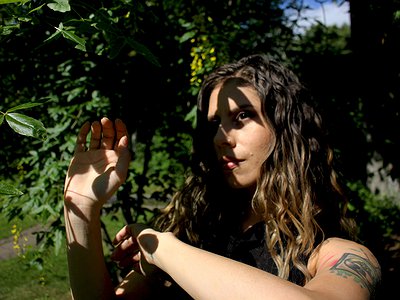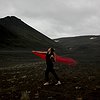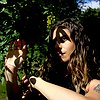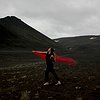Name: Lush Agave / Alisha Erao
Nationality: American
Occupation: Producer, songwriter, vocalist
Current release: Lush Agave's “Hidden Eden”, a concept musical short film and art zine created in Iceland. Purchase from Never Content (USA) or Sacred Sea (EU).
Recommendations:
Transcendent Waves: How Listening Shapes Our Creative Lives by Lavender Suarez
Song to the Moon by Antonín Leopold Dvořák, performed by Renee Fleming
If you enjoyed this interview with Lush Agave visit her homepage for more information. You can also find her on Facebook, Soundcloud and Instagram.
When did you start writing/producing music - and what or who were your early passions and influences? What was it about music and/or sound that drew you to it?
As a classical vocalist, I didn’t always feel empowered to create my own compositions, and I didn’t really have anyone in my community to look to for learning how to even start.
My early childhood musical inspirations were drawn heavily from my Catholic upbringing. I looked forward to mass each Sunday just to hear the choirs and how the vocal textures floated around a big reverberant space.
My uncle was probably my main “contemporary” music teacher - turning me onto the Beatles, John Prine, and Iris Dement at a very early age. It wasn’t until college that I began recording my own songs and playing around with production.
For most artists, originality is preceded by a phase of learning and, often, emulating others. What was this like for you: How would you describe your own development as an artist and the transition towards your own voice?
The emphasis of correct technique was always at the front of my mind, due to classical voice “trauma”. When I ventured outside that genre, I felt like a fish out of water. I had a hard time understanding what my “casual sound” was.
I remember the first glimpse into what my unique sound could be was when I was singing along to Patti Smith, mimicking the way she accentuated her vowel shapes. The way the sound of her voice formed around her words inspired me to start thinking, “what am I trying to say, and what are the ways I can translate it from my unique perspective?”
How do you feel your sense of identity influences your creativity?
I believe our creativity is a tool for processing our internal and external world. Lush Agave is specifically drawn from deep experiences and emotions that I have not always been able to freely or confidently share. It is a way of finding peace with painful memories and using them to create something beautiful, in hopes that I am paying that ability forward to those who I am sharing with.
What were your main creative challenges in the beginning and how have they changed over time?
Time and energy have always been a challenge. I have a really bad habit of biting off more than I can chew in my work and personal life. My full-time job at the moment is also remote, so staring at a computer screen for 9-10 hours a day makes me less inclined to want to jump into Logic afterward and edit a track.
I try to stay balanced as much as I can and surrender to the fact that my process may be slower than other artists with a different set of circumstances.
As creative goals and technical abilities change, so does the need for different tools of expression, be it instruments, software tools or recording equipment. Can you describe this path for you, starting from your first studio/first instrument? What motivated some of the choices you made in terms of instruments/tools/equipment over the years?
I’ve always taken the approach to use what I had.
At first it was just my voice and a beat up casio and I recorded sounds through laptop mic in Garageband. Lofi, garage rock, and early punk music was inspirational to me early on because it just didn’t require much or “good” equipment. It also opened the possibility of experimenting with my voice to do the total opposite of what my instructors had pounded into my head - I purposefully tried to sound “bad”. It was so fun and relieving. It opened the door to more freedom of expression.
As knowledge of my tools, access to new gear, and performance experience has naturally deepened my understanding of my art, I’m constantly reminding myself having to keep that beginner’s mind at play. Introducing new equipment is fun, but I try and keep things simple for the most part and have a super minimal setup for live performances - it’s really just a sampler and a loop pedal.
Have there been technologies or instruments which have profoundly changed or even questioned the way you make music?
Loop pedals changed everything for me when I finally figured out how to use them. I was able to be a one-person choir!
Collaborations can take on many forms. What role do they play in your approach and what are your preferred ways of engaging with other creatives through, for example, file sharing, jamming or just talking about ideas?
It’s interesting, because since I started Lush Agave, I haven’t collaborated with people as much as I had in other projects. I think it’s because this has felt so deeply personal. But I do feel the need to expand upon that lately.
There’s an opportunity for a different kind of growth in collaboration, so I’m looking forward to exploring that more with this project. Working with Wild Anima on our short film, “hidden eden'' was a good stepping stone because while it was a collaboration, we were still presenting our distinct projects within it.
Even through that experience and others, I find I work best when I have some time alone to process and experiment. The file-sharing approach works well for me. When it comes to singing, I have a little easier time jamming. Maybe it’s the instrument I’m most confident in. My friend Elisa Faires has been a wonderful teacher in improvisation for me over the years. It’s definitely a good way to curb perfectionist and rigid tendencies.
Take us through a day I n your life, from a possible morning routine through to your work, please. Do you have a fixed schedule? How do music and other aspects of your life feed back into each other - do you separate them or instead try to make them blend seamlessly?
I work full-time for a software company based on the east coast. Since I’m in Los Angeles, I usually wake up between 5:00-5:30 am to start work at 6:00 am. When I’m taking proper care of myself, I take time in the morning to meditate and journal. Before the pandemic, I would go to the gym after work when I get off at 3pm or 4pm - I really love strength training. That looks a little different now since I don’t have access to barbells, but I’ve made due with altering my routine to incorporate more bodyweight exercises. Afterward, my partner and I spend time together and cook before I go to bed at 9pm.
It’s challenging to try and make creative space for music during the week due to my schedule. It’s a practice, and I don’t always do it well. Music used to be way more integrated into my life when I taught voice lessons for over 10 years. My decision to get a “real job” is one I’ve continuously struggled with. I felt like I gave up a huge part of my identity and something I loved. On the other hand, I am grateful to not have to struggle as much financially and can support my family. My time has been the biggest sacrifice, so I’m still working on finding the little ways in which I can be continuously integrating music and my practice into this schedule.





